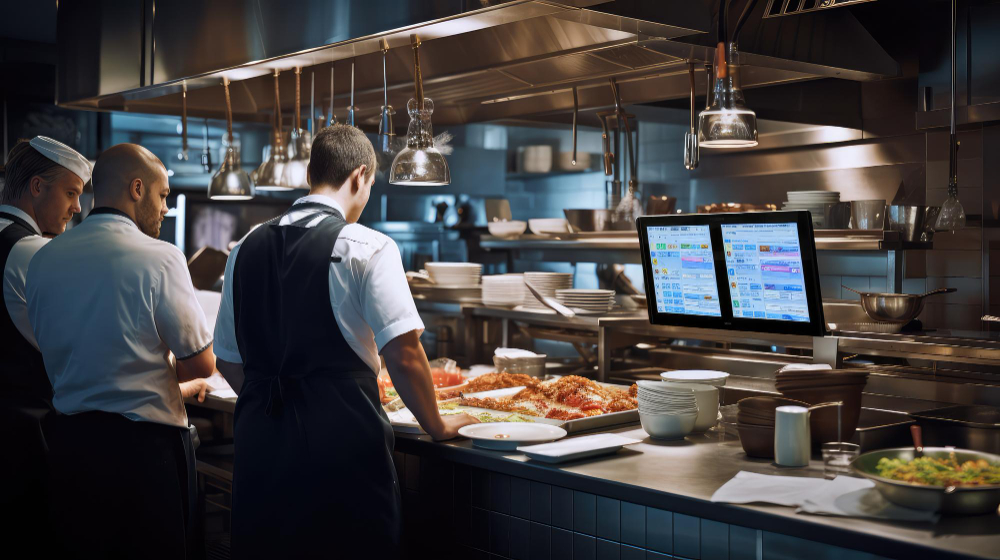Running a restaurant business is not easy. You have to manage everything from customer orders, inventory levels, product shelf life, and books of accounts. Sudden demand fluctuations can lead to workflow difficulties, inefficiencies, and mismanagement at different levels, leaving your business in complete chaos. Without an end-to-end system of business management, you risk burning a hole in your own pocket.
Let’s deep dive into how ERP software can help you keep track of everything and manage your business complexities with ease. Let’s begin.
What is Restaurant ERP?
A Restaurant ERP is an end-to-end system that provides complete visibility across every aspect of your restaurant business and equips it with powerful analytical tools and industry-tailored modules to streamline your everyday business activities.
There is a growing trend in the Indian restaurants of adopting Enterprise Resource Planning tools. This allows them to ensure consistency in the food quality, reduce spoilage & contamination, minimize material waste, and adapt to ever-changing industry requirements. With access to powerful models such as demand forecasting, they can make timely & informed decisions, and stay ahead of their competitors.
An Overview of the Restaurant Industry
The Indian restaurant industry is estimated to be $17.54 billion in size. It is expected to grow at a CAGR of 8.33% despite facing several challenges such as COVID-19, increasing operational costs, and policy bottlenecks, among others. According to a news report in Business Standard, the industry is expected to generate a whopping 15 million new job opportunities by 2028.
You May Also Like:- ERP For Food Industry
Challenges faced by the Restaurant industry
Demand, labour and inventory management are the major challenges in the restaurant industry. Being the owner of the restaurant business is kind of a lifestyle and full-time job. And it is a constant pressure to overcome those challenges quickly to avoid serious problems.
1.Stock and inventory wastage
Uncontrolled stock wastage is the major challenge under this criteria. A top restaurant chain’s inventory management entails juggling multiple processes and components to ensure smooth operations.
Restaurant deals with mostly perishable goods, so they have to move out of the inventory frequently. To achieve this, the inventory is frequently altered. When given focus on food costs, ingredients and raw materials, these items have a short shelf life which will impact the inventory costs.
2.Demand forecasting
The restaurant management system is intricate. It is crucial to have an accurate record of the stocks, as it will impact the inventory. Precise demand forecasts are essential to lower input costs. Overstocking raw ingredients in the inventory may eventually result in a lot of food waste which will impact the revenue of the business.
3.Stock Theft
Stock theft is dangerous for this business. This causes huge financial losses for many restaurant owners and businesses each year. Identifying and preventing theft should be one of the priorities of the business.
4.Monitoring and managing stock in multiple branches
Some restaurants usually have corporate and franchise locations with warehouses spread everywhere. And these outlets and warehouses usually won’t be in sync with each other.
For example, In one of the inventories, there will be excess flour and in another location, there is a shortage. So here one restaurant, the flour crosses the expiry date and had to be thrown, while the other restaurant purchases the product.
5.Vendor management
Each time restaurant deals with multiple suppliers for various kitchen items such as utensils, equipment, ingredients and furnishings. It is important to analyse if the maximum value is received for the goods purchased from the supplier.
6.Calculating and determining the pricing of the dish
Pricing and controlling food costs is a critical step in the food industry. Lacking knowledge regarding the ingredients or food production, and demand for the dish will become difficult in calculating the pricing of the dish.
How can Restaurant ERP help?
Restaurant ERP is a partly cloud-based food ERP software service that lets you record, manage and access all your crucial data whenever you need it. For a restaurant, inventory management is very crucial, the cloud-based maestro can easily maintain the entire inventory, providing you with timely notification for low stocks, and keeping you ready at all times.
Benefits of Restaurant ERP software
A restaurant ERP system acts as a central kitchen management offering multiple benefits such as streamline the restaurant’s operations, automate stock replenishment, table management, improve efficiency in the ordering system, quality management, seamless online ordering, data security, efficient inventory management and many more.
Restaurant ERP software is a modular cloud-based platform which helps the business to achieve growth and revenue faster.
1. Efficient inventory management and control
Restaurant management software provides better real-time status of the inventory. It gives access to inventory data such as stock availability, consumption and stock requirements. With the inventory management module, keep the records of suppliers and recipes, and automate invoices and receipts which will help in accurately managing bookkeeping.
2. Automate stock replenishment notification
With an efficient restaurant management system, the outlets can circulate stocks on a monthly and weekly basis by receiving stock requirements notifications automatically. With a centralised database, Lot/batch tracking becomes simplified, thus saving the business from raw materials wastage.
3. Efficient demand forecasting
With the right restaurant management system(Restaurant erp and general ERP systems), seasonal demands and market trends reports can be generated and issued which will help in effective inventory management and will help in making insightful data-driven decisions.
4. Avoid stock theft
Stock theft can be avoided with the help of the best ERP software. It helps in creating roles and permissions for every task, thus eliminating internal thefts.
5. Better supplier management
With efficient restaurant ERP solutions, easily track the purchase history of each supplier to know the best rates and other factors like timely delivery, service quality etc.
6. Financial transactions and analysis in detail
Details regarding the revenue earned for each item can be acquired. This will help the business owners to identify which menu item sells the most. It helps in differentiating the least-selling item.
7.Automation of staff management system
ERP for restaurant chains has an automated leave management tool that can record, track, monitor and evaluate your staff leave and attendance details with just a few clicks. In addition, it automates the entire employee data.
8.Error-free payroll disbursement
Automation enables timely and error-free salary payments to employees. And it becomes effortless to take care of overtime duty, weekends, offs and other information.
9. Real-time bank reconciliation
The restaurant ERP system helps in smooth integration with the bank and enables real-time bank reconciliation. It will be easier to acquire a real-time accurate view of the cash flow and actual cash position.
10.Maintaining customer details
ERP system for restaurant help in capturing relevant details such as relevant details, saving contacts, scheduling campaigns and outreach programs. Important details of the clients can also be tracked like birthdays, anniversaries and easily get a hold of them with various marketing campaigns.
Also Read:- Top Cloud-Based Maintenance Management Software
Key Features of ERP for Restaurants
- POS integration for precise finance management.
- Manage purchase orders and inventory control.
- Stay upright to compliance and safety regulations.
- Efficiently manage the general ledger, assets, finances etc.
- Easy to use staff management.
- SCM for timely Home delivery.
Optimize Your Restaurant Operations with Sage X3
Finally, ERP systems for restaurants have revolutionized this sector by streamlining restaurant operations, real-time reports, seamless inventory management, supporting customers, and boosting overall efficiency and profit. Plus, it helps in staying competitive in this dynamic market.
Sage X3 is an easy-to-use business management tool that can be customized to your needs for effective and optimized business performance. Its smart business modules cater to all your nominal tasks and help you provide excellent service to your customers and prevail as a business.
Frequently Asked Questions (FAQs)
1. What is ERP in restaurants?
Restaurant ERP software is a comprehensive software used by restaurant businesses in India to streamline their everyday activities, reduce costs, and achieve operational excellence. It provides deep analytical reports, demand forecasting models, and robust analytical tools for smart decision-making.
2. Which software is best for restaurants?
Sage X3 is the best ERP for restaurant chain that helps you adapt to latest industry protocols, eliminate over-ordering of food ingredients, gain inventory traceability, and ensure adherence to India’s packaging and labelling requirements. It is a highly-flexible and customizable ERP application that comes with dedicated modules to improve your business efficiency and mitigate challenges.






